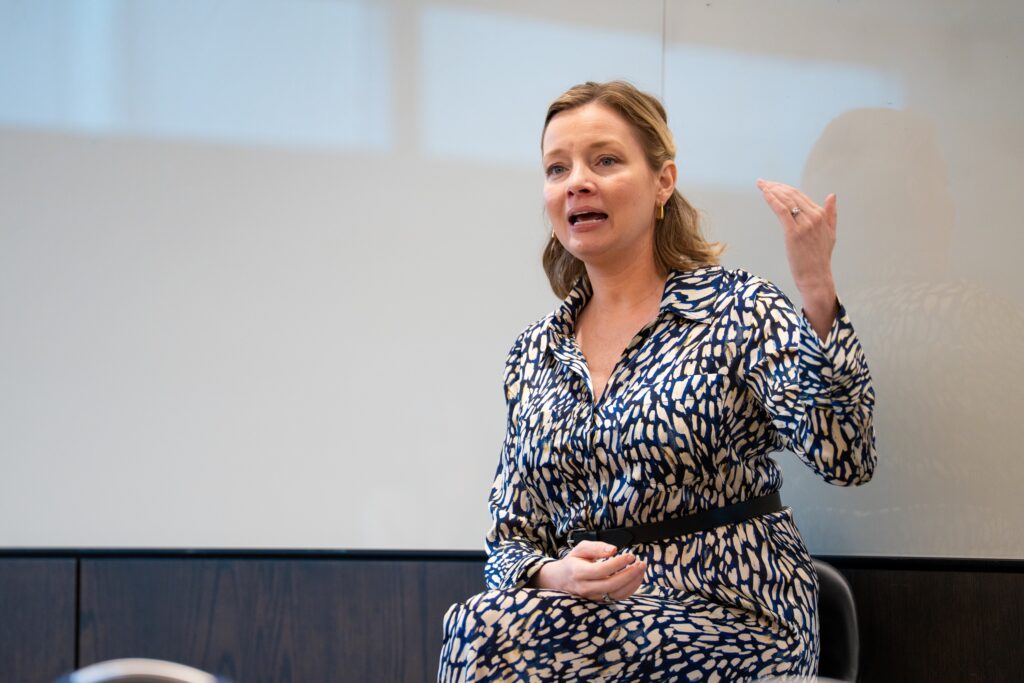3 things Kristen Soltis Anderson wants you to know about Gen Z—and today’s politics
The Johns Hopkins alumna and Republican pollster said the next generation isn’t moving left or right. They’re questioning the whole system.

When millennials voted in 2008, 2 out of 3 who were younger than 30 voted for Barack Obama. In the following presidential elections, Democratic candidates held 60% of the under-30 vote. But last November, President Donald Trump broke through with this demographic and won an estimated 54% of voters aged 18 to 29.
For Kristen Soltis Anderson, CNN political commentator and author of The Selfie Vote: Where Millennials Are Leading America (And How Republicans Can Keep Up), it’s proof that Gen Z, those born between 1997 and 2012, is politically distinct from previous generations. The Republican pollster believes these voters offer clues about where the country is headed.
As a Republican undergraduate student at the University of Florida, Anderson’s political affiliation was typical—until Obama’s meteoric rise. In 2008, young voters began swinging toward the left in big ways. The shift sparked Anderson’s curiosity: Was it typical for young voters to start out progressive and grow more conservative with age? Or was the youth vote breaking for Obama?
These questions became the foundation of her master’s thesis at Johns Hopkins University. And she recently returned to her alma mater to re-engage the topic with a new generation, and fresh urgency, in mind.
“When you study what young people are thinking about the country, you can see more of where things are headed over the long term,” she said during a lunch event at the Johns Hopkins University Bloomberg Center.
These are her key insights for policymakers looking to communicate with young voters.
- Gen Z is rethinking the political playbook
Anderson doesn’t quite agree that it is as simple as voters lean left when they’re young and grow more conservative with age. While people’s views can shift, they don’t do so in a straight line. What truly shapes a person’s politics, she said, is the political climate when they come of age.
Millennials, she said, came up “steeped in this Obama-era notion of ‘Let’s try to find bipartisanship.’” In contrast, “Generation Z wants nothing to do with that. They think that institutions are all broken, bought, and horrible, and need to be completely rethought from the ground up.”
Many in Gen Z came of age during the COVID-19 pandemic, which disrupted their education, friendships, and early adulthood. Anderson said losing formative moments made many of them want to “burn it all down and start from scratch.”
Anderson said she hopes political leaders will find a way to communicate with Gen Z to bring about reform without young people “curdling into distrust, cynicism, and things that can go in a more negative direction.”
- Populism is rising, and trust is collapsing
While it might, on the surface, appear that the U.S. has surged rightward in recent years, Anderson said it’s more accurate to say the country has embraced populism, and with it, a collapse in trust in a lot of major institutions, such as the news media and the military.
Even Democrats, who have historically trusted members of the media, are now expressing skepticism about it, she said.
“The decline in trust we’re seeing in the media is not actually being driven by Republicans,” Anderson said. “That already happened a decade or two ago. It’s happening from the left.”
- Our current political climate is a “broken thermostat”
Normally, Anderson explained, voters act like a thermostat, correcting course when things swing too far in one direction. If things get too hot under one party, the electorate cools things down by swinging the other way. But what happens when the thermostat is broken?
“You just have to keep cranking more and more and more heat into this room in order to try to balance out the broken window or the broken HVAC system,” she said. “That’s what I worry we’re in today.”
At the moment, Anderson said, neither side feels like it’s winning. Despite having a Republican president, many conservatives still feel embattled. And Democrats, shut out of the White House and relegated to a minority party in Congress, feel powerless as well.
“And when you feel like you’re losing, you’re more willing to excuse bad behavior on your side,” she said.